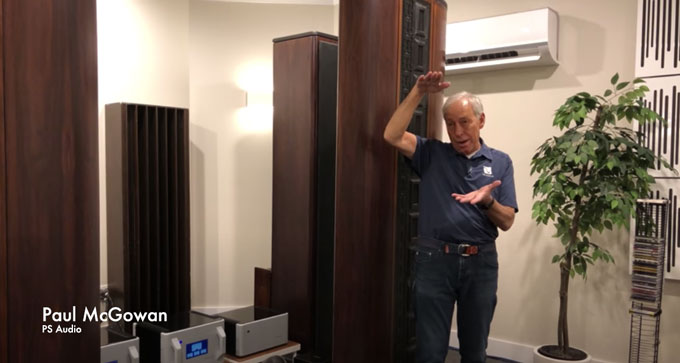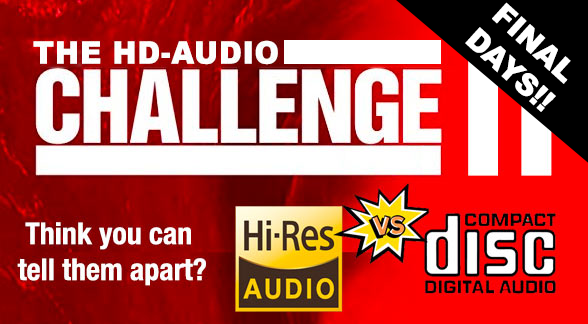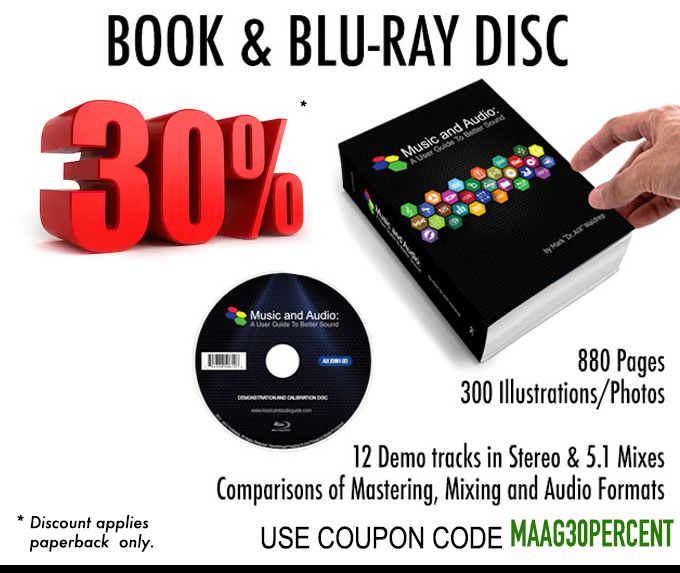Find an Expert, Lose the Sales Pitch!
Having been involved in high-end audio for many years as an audio engineer, record producer, writer, and having garnered a reputation as somewhat of a contrarian when it comes to some well-established norms in our hobby, I receive a fair number of emails from readers wanting my input on a specific piece of equipment, audio format, or technical issue. If I believe I can contribute something valuable to the discussion, I respond (which you probably guessed is most of the time).
Recently, I was asked to chime in on the continuing insistence by several high profile “experts” on the issue of high-resolution audio. As most of you know, I’ve spent over 20 years engineering, producing, and releasing native high-resolution audio recordings on my boutique label AIX Records and the newly relaunch iTrax download site. I have been a strong advocate for high-resolution, surround music. I’ve read numerous AES Journal articles, had discussions with industry luminaries like the former president of the Audio Engineering Society, Sean Olive and Robert Stuart, the person behind MQA and the head of Meridian Audio.
In addition, I’m friends with other individuals involved in the dissemination of important information on high-end audio. Fred Thal of ATAE is one of the world’s authorities on analog tape recording, Archimago’s blog is a must read for those seeking unbiased facts about audio, Ethan Winer, The Audio Expert, is a valuable and trusted resource, and John Siau, the head of Benchmark Media Systems, writes and posts white papers that provide insights into a variety of subjects. These are experts that you can trust.
But there continues to be regular stream of sales pitch videos, interviews with “experts”, admin posts and comments on FB audio groups, online magazine reviews written by unqualified audiophile society presidents, reviews that sound like they’re authored by marketing professionals not journalists, and even academic papers that present incorrect or misleading information about high-resolution audio. Why do these sources of misinformation persist?
Paul McGowan, the very public face and owner of PS Audio and a friend, addresses the issue in a 5-minute video posted on March 23, 2020 on his regular YouTube channel. In a video titled “Is high resolution audio snake oil” at about 2:53 seconds, he states without hesitation when referring to high-resolution music, “Can we hear a difference? Oh God yeah.”

I’m not sure who the “we” is that he’s referring to but it’s certainly not members of the audiophile community. Paul should give the HD-Audio Challenge II a try. If he’s like the 350 other individuals that have participated in the survey and submitted their results, he might rethink his pronouncements on high-resolution audio. The audiophiles that have downloaded the 20 tracks and spent time carefully listening on their own systems have averaged around 40% in correctly identifying the high-resolution masters over CD downconversions. In fact, there are dozens of respondents that stated they couldn’t tell them apart at all. And remember these are real high-resolution audio — the same native high-res, 96/24 bit master from which a CD-res downconverted version was created. This is a comparison that is tough to find in the commercial world.

You’ll undoubtedly see comments like this, “for me, I just got the DSOTM and WYWH Pink Floyd tracks in 24/96 and I have the originals. Big difference. There were literally sounds that you couldn’t hear in the low res.” Unfortunately, a comparison of a remastered release vs. an original vinyl LP is meaningless.
There was one individual that scored a perfect 100%. I was somewhat shocked and dismayed until I read his comments. His methodology ignored the requirement that participants use only our ears — no analysis is allowed. He stated, “Comparison of A/B several times, taking a specific part with higher dynamics (15-20 seconds) and choose the one with the highest peak level which is given on JRiver DSP Studio Analyzer shown during playback. I used realtime switching between tracks comparing the peak level of 15-20 sec parts with higher dynamics. In fact, the determination of HR version by listening parts of the track and comparing A/B was confirmed or decided by the highest peak level if i could not hear any difference.”
After I read his note, I went back and checked ALL of the files and sure enough the absence of ultrasonic information in the CD version reduced the peak amplitude by as much as .2 dB. That’s not very much and for all of those that didn’t looked at their peak meters while listening, the difference seemed not be audible. But I went back and changed the gain on the lower tracks so that they matched. The files now have exactly the same duration, same levels, same everything except the original sample rate and word length — the two essential parameters of hi-res audio.
When reading reviews, watching videos, or listening to experts that immediately pivot to pitching their own products beware! I get it. The reason that Paul or other experts spend time and resources posting daily articles/videos, posting conversation starters on their FB Groups, or writing articles/reviews for online publications is to drive more traffic to their sites, build brand recognition, and ultimately sell more of something. For Paul, selling more PS Audio equipment keeps his company in business and his employees paid. For FB admins, it’s about clicks and member counts. Magazines offer articles and reviews to engage readers and sell advertising — it’s all about click throughs and site views. It boils down to money.
I get it. And I’m guilty of the same thing. I want my blog to attract readers. I want people to purchase AIX Records albums or iTrax downloads and I would love readers to buy the Music and Audio: A User Guide to Better Sound. But my livelihood doesn’t depend on selling another disc, download, or book. If I never had to mail another package, my mortgage, credit cards, and other obligations would still get paid.
But it does cause me concern when I see “so-called experts” recommending and selling audiophile grade fuses, gold-plated duplex boxes, expensive “directional” power cords or interconnects, RF generators or bogus acoustic treatments, CD demagnetizers, and other hocus pocus. Audiophiles deserve better. Websites, magazines, and independent experts should be more transparent when they offer advice and then turn around and offer a FREE 30-day trial for their new $3500 power cord or $5K DAC. There are things that matter a lot in this hobby and things that don’t. Experts don’t always tell you which is which.
++++++++++++++++++++++++++++++++++++++++++++++++++++++++++++++
RIP Ian Whitcomb
Dominic Robelotto, a former student and engineer at AIX Media Group, texted me early this morning to inform me that Ian Whitcomb had died. He was 78 years old. Apparently COVID-19 was not the cause of his death, he had been in ill health for a while and suffered a stroke in 2012. Ian and the Bungalow Boys were featured on the AIX Records “Turned On Alley” and was the special guest on Fred Sokolow’s AIX Records production along with Junior Brown. Another loss for music and for the AIX family or artists.
A Music and Audio User Guide 30% OFF Special Continues
In these challenging times, all of us are being asked to sacrifice and find ways we can help others. I have talked to a few of my musician friends over the past couple of weeks. They are really struggling because ALL their gigs have been cancelled or delayed. Guitarist Dorian Michael, a very close friend and artist on AIX Records, was here recently and told me that he’s taking on students and teaching via FaceTime instead of traveling up and down the west coast doing concerts as he had planned. And who knows how long this situation will last?
So I encourage you to support the artists on my label by buying a disc or asking for a music download (more on that in a moment). I will extend the AIX30Percent coupon until the “stay at home” orders are lifted.

In addition, I’m discounting paperback copies of my book Music and Audio: A User Guide To Better Sound by 30% for the same duration. Use the coupon code MAAG30Percent during checkout. Note that this applies only to the paperback version. But anyone that purchases the paperback will get the eBook in PDF format as well.
I will donate 25% of the sales receipts to an as yet to be determined GoFundMe campaign in support of struggling musicians.



Funny, I just watched Darko’s “I Trust in Experts (Don’t You?)” video. Not because I thought I would learn something, but I was curious on how he was going to use expert findings to back his very subjective views on audio equipment.
He starts with a story about the debate in the past of whether the Earth is flat or round. And he points out that although the “experts” initially ran into fierce resistance for their insistence that the Earth is round, that eventually the thinking changed. Darko then insists that we are simply in that same resistance phase of the fact that one digital transport can sound significantly better than another. The experts have shown that the “very real” reason why one digital transport can sound significantly better than another, is jitter and electrical noise, and eventually we will believe the experts. Besides, he says, it happened in the case of cables where people originally did not think there was an audible difference, but now they do. What? Maybe his subscribers, but there are plenty of people who disagree with that assertion.
My own thinking is sure, experts can show you the phenomenon of jitter and electrical noise exists, the problem not touched on here – is it audible? Archimago has been pretty thorough in his posts of demos/measurements showing that jitter is a boogeyman. It’s just not a problem in decently designed digital audio equipment. I would say the same for electrical noise. Any competently designed audio component will not have spurious electrical noise that is audible.
Thanks for the response. You’re right. I don’t know John Darko but from the interviews and articles that he’s presented, I view him as another audiophile journalist trying the build an audience — without much substance. He buys into the audiophile myths including cables, tweaks, power cords, MQA, and jitter. Bob Levi and the whole crowd at Positive Feedback Online do it to the extreme! Just because you’re an audiophile, doesn’t give you any credibility when it comes to reviewing or discussing hardware or software. I was told by a close friend of Mr. Levi’s that he believed the Plus (+) and minus (-) signs on the back amplifiers and speakers indicated positive and negative voltage connections like batteries! And he’s allowed to write articles on high-end audio?\
You’re right about jitter. I love the effusive reviews on “low jitter” cables when any decent DAC ignores the clock signal and recreates its own. It’s hard to keep calm in the midst of the craziness in this hobby.
Hello Mark. I don’t have any hi-resolution downloads, but I do have hundreds of CD’s. I just listed to an old Leo Kottke CD recorded in 1986 and the sound was fantastic. The liner notes listed the old, DDD information and that the recording took place at the Record Plant in NYC. It is almost impossible to find a new recording on CD that sounds very good. What good is Hi-res if people are still having trouble with basic digital recording Technics?
I don’t trust anyone. I’m an engineer and a scientist, not an audiophile. If I have any tentative trust at all it’s in the engineering and science textbooks I was trained from. I have particular problems with physicists but that’s another story. Once I was an audiophile and believed everything audiophiles of the day believed. My experience with quadraphonic sound in 1974 was a terrible and surprising disappointment. I had a lot of experience listening to live music at concerts as well as recordings at home. Quadraphonic sound and its derivatives sound nothing like live music. Neither does HD. I thought about how the acoustics of place affects sound and how it is perceived, in short how sound is propagated and how performance venues change sound. And then one day it all came to me in a blinding flash. From that moment on I was never an audiophile again.
My understanding of sound hasn’t changed in 47 years. Nobody tries harder to blow holes through theories than I do including my own. So far it’s still credible. A variant of the invention that came from a mathematical model (never published) was explained in my US Patent 4,332,979. It has no commercial possibilities and I have nothing to sell. This is only a hobby. The existing prototype, probably the only one of its kind in the world is based on the Patent which is the kindergarten version of the invention. Its only challenger as far as I know is Wave Field Synthesis which may be the same invention drawing the same conclusions starting from a different point and following a different path. As for people in this industry their understanding of the critical elements of sound and hearing, and their products are by comparison primitive and by themselves are either grossly incomplete or just plain wrong.
I predicted that there would be no audible difference between RBCD and HD in a fair test. So far Dr. Waldrep’s method is the only one I know of that is fair. All other tests include other variables that alter the results. Using a different D/A converter for example makes the comparison invalid.
As for the advice of experts, even well meaning ones like the one cited above is constantly changing his opinions. What’s even more discouraging is that they’ve been producing the same conceptual design for over 60 years in endless permutations but the results are always the same. To cite the “expert” above when he came back from a performance of the Metropolitan Opera in New York to his sound system with the speakers above in the photograph to see how it compared his exact words were “curses, canned music.”
Mark, we’ve talked before about what matters in a recording. I have never believed that the goal is to recreate reality. Recording technology can be used as its own distinct creative platform to capture and reproduce music in ways that live performances can’t. Just my two cents.
I want to add that I greatly appreciate the skill so many recording engineers and I’m certain Dr. Waldrep is among them have shown in the quality of the products they produce. If they didn’t create products of such high quality as they do, then my objectives would be a hopeless task. As I see it their goal is to produce the best sounding recordings they can using the recording and playback technology available. My goal is to manipulate it into something entirely different using a different playback technology. I’ve had consistently very good results from practically every recording dating back to those made in the United States from the late 1950s and in Europe from the early 1960s.
So I have been playing in the high res game for a while. I own a Tascam Dr-680 MK2 and have had great fun using it to record local university concerts and also public schools, pre pandemic and have had great fun giving students copies of their performances for them to hear themselves as the audience hears them and for them to get better. These recordings motivate them.
In my own recordings with the Tascam I have little ultrasonic ringing past 22khz, most down to -90db and -100db. This is at either 2496 or 24192. I really like 2496 as it sounds great to me. I occasionally think I can hear more at 24192, but at nearly 74 I think I am trusting the math more than my ears.
I do like SACDs and DSD, but have a problem with the ultrasonic noise that is sitting at -60db. That noise floor is not any better than tape, but the audio I can hear seems much smoother. I am using a very affordable Project Audio S2 USB dac for computer use, and a 2nd for upgrading my old disc spinner DVD player so I can play my DVD 2496 burned files.
The Tascam 680 can do 6 tracks of 2496 and 2 of 24192. I have thought about a Tascam DA-3000, but not so sure anymore. I don’t computer record anymore as I lost a concert once, and that was that. Mastering and disc burning only in my computers.
I am surprised that in DSD they don’t use some lowpass filter at, say 40 khz and lose the noise. I don’t understand why this has not happened? My Project DACs have filter choices I like. Not totally high end, but enough for me.
When I start recording again I will do everything in at least 2496 and some at 24192 just for some more science projects. Nothing like leaving a venue with the most I can.
I had been using MusicScope to look at the FFT, but now they seem out of business and can’t buy a full license. I could at least look at the DSD files in that.
Still learning.
Would you consider that Paul McGowan may actually believe what he says?
I’m not saying he’s right or wrong, just that he believes DSD is superior to PCM.